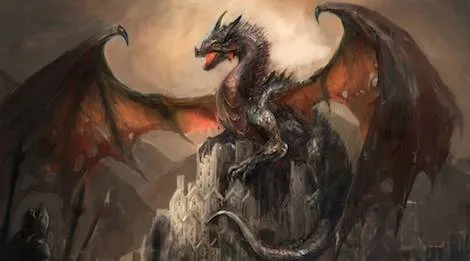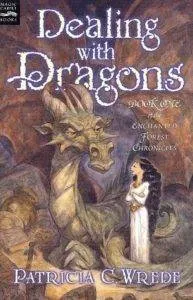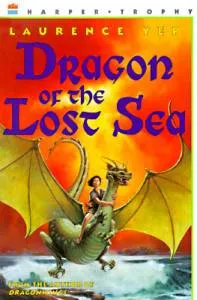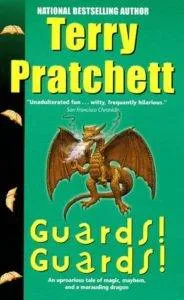
Dragon Books and Subverting the Narrative
This content contains affiliate links. When you buy through these links, we may earn an affiliate commission.
I’ve always loved dragons. There’s just something so enchanting about them – don’t ask me what, exactly. If you broke it down into parts, it just wouldn’t work. I’m not particularly into lizards (no offense to the fine, scaly specimens), and no other magical creature has the same taloned grip on my heart.
I guess, what I love is the idea of dragons – the stories they inspire and what they represent. The funny thing here is that my earliest exposure to dragons wasn’t the typical fantasy narrative. You know, area knight brandishes sword at local serpentine menace for the benefit of an unattached princess. That isn’t the narrative I fell in love with at all.
 What hooked me were the books that told a different story about dragons. They introduced me to humor, innovative storytelling, and fresh perspectives. They told me, “Here’s how it usually goes, but also screw that.” I learned early on that it was okay to change up and subvert the narrative. Dragons aren’t always meant to be defeated. You can befriend them or debate them or even cook cherries jubilee for them. And by extension, princesses don’t have to be damsels in distress. They can be warriors or diplomats or even dragons themselves.
For a window into what exactly flipped my perception of dragons, you have only to look at the books I read growing up:
First and foremost were The Enchanted Forest Chronicles. In Dealing with Dragons, Princess Cimorene runs away from home to become princess to a dragon – all so she can avoid marrying the prince and doing what princesses are expected to do. The dragons she encounters range from the curmudgeonly uncle type to the oh-so-practical Kazul. It would be a huge understatement to say that this series had an impact on me.
What hooked me were the books that told a different story about dragons. They introduced me to humor, innovative storytelling, and fresh perspectives. They told me, “Here’s how it usually goes, but also screw that.” I learned early on that it was okay to change up and subvert the narrative. Dragons aren’t always meant to be defeated. You can befriend them or debate them or even cook cherries jubilee for them. And by extension, princesses don’t have to be damsels in distress. They can be warriors or diplomats or even dragons themselves.
For a window into what exactly flipped my perception of dragons, you have only to look at the books I read growing up:
First and foremost were The Enchanted Forest Chronicles. In Dealing with Dragons, Princess Cimorene runs away from home to become princess to a dragon – all so she can avoid marrying the prince and doing what princesses are expected to do. The dragons she encounters range from the curmudgeonly uncle type to the oh-so-practical Kazul. It would be a huge understatement to say that this series had an impact on me.
 Then there was Dragon of the Lost Sea. Laurence Yep’s series centers on young Thorn and the dragon princess-in-exile Shimmer. They journey forth to win back Shimmer’s sea kingdom, with the help of classic Chinese characters such as the Monkey King. Not only was the dragon in this series a straight up princess, but these books also portrayed another, non-Western take on the dragon of fantasy lore. This was so, so important to me as a Taiwanese American kid growing up.
I came to Diana Wynne Jones’ books later, strangely enough. After I gobbled up Howl’s Moving Castle and The Chronicles of Chrestomanci, I picked up Dark Lord of Derkholm, and it instantly became one of my favorites. That particular book was born out of the parody fantasy guidebook The Tough Guide to Fantasyland. The people of The Dark Lord of Derkholm, and in particular one family, are faced with the task of hosting Pilgrim Parties from well, our non-magical world… and that means creating a typical fantasy adventure, complete with an Evil Enchantress, Dark Lord, and Winged Minions. And of course, there’s a dragon who, in keeping with the rest of the book, is not what you’d expect.
Then there was Dragon of the Lost Sea. Laurence Yep’s series centers on young Thorn and the dragon princess-in-exile Shimmer. They journey forth to win back Shimmer’s sea kingdom, with the help of classic Chinese characters such as the Monkey King. Not only was the dragon in this series a straight up princess, but these books also portrayed another, non-Western take on the dragon of fantasy lore. This was so, so important to me as a Taiwanese American kid growing up.
I came to Diana Wynne Jones’ books later, strangely enough. After I gobbled up Howl’s Moving Castle and The Chronicles of Chrestomanci, I picked up Dark Lord of Derkholm, and it instantly became one of my favorites. That particular book was born out of the parody fantasy guidebook The Tough Guide to Fantasyland. The people of The Dark Lord of Derkholm, and in particular one family, are faced with the task of hosting Pilgrim Parties from well, our non-magical world… and that means creating a typical fantasy adventure, complete with an Evil Enchantress, Dark Lord, and Winged Minions. And of course, there’s a dragon who, in keeping with the rest of the book, is not what you’d expect.
 I’d be remiss if I didn’t bring up Terry Pratchett’s Guards, Guards. Every one of Pratchett’s books deal with satirizing and drawing new ways of looking at real life. In Guards, Guards, the main subject of parody is the classic story of the lost king searching for his birthright, with the help of a slain dragon or two. But of course, things don’t go that way, thanks to Captain Vimes and Constable Carrot of the Ankh-Morpork Night Watch.
Every so often, I return to the famous G.K. Chesterton quote that goes — “Fairy tales do not tell children the dragons exist. Children already know that dragons exist. Fairy tales tell children the dragons can be killed.” The thing is, I’d much rather know that there’s more to dragons – and everyone else, for that matter – than that. I want to know that dragons can be allies or frenemies or tiny, fire-farting pets.
But that’s just how I feel. What’s your take on dragon stories? And what’s your favorite dragon-centric book?
I’d be remiss if I didn’t bring up Terry Pratchett’s Guards, Guards. Every one of Pratchett’s books deal with satirizing and drawing new ways of looking at real life. In Guards, Guards, the main subject of parody is the classic story of the lost king searching for his birthright, with the help of a slain dragon or two. But of course, things don’t go that way, thanks to Captain Vimes and Constable Carrot of the Ankh-Morpork Night Watch.
Every so often, I return to the famous G.K. Chesterton quote that goes — “Fairy tales do not tell children the dragons exist. Children already know that dragons exist. Fairy tales tell children the dragons can be killed.” The thing is, I’d much rather know that there’s more to dragons – and everyone else, for that matter – than that. I want to know that dragons can be allies or frenemies or tiny, fire-farting pets.
But that’s just how I feel. What’s your take on dragon stories? And what’s your favorite dragon-centric book?
 What hooked me were the books that told a different story about dragons. They introduced me to humor, innovative storytelling, and fresh perspectives. They told me, “Here’s how it usually goes, but also screw that.” I learned early on that it was okay to change up and subvert the narrative. Dragons aren’t always meant to be defeated. You can befriend them or debate them or even cook cherries jubilee for them. And by extension, princesses don’t have to be damsels in distress. They can be warriors or diplomats or even dragons themselves.
For a window into what exactly flipped my perception of dragons, you have only to look at the books I read growing up:
First and foremost were The Enchanted Forest Chronicles. In Dealing with Dragons, Princess Cimorene runs away from home to become princess to a dragon – all so she can avoid marrying the prince and doing what princesses are expected to do. The dragons she encounters range from the curmudgeonly uncle type to the oh-so-practical Kazul. It would be a huge understatement to say that this series had an impact on me.
What hooked me were the books that told a different story about dragons. They introduced me to humor, innovative storytelling, and fresh perspectives. They told me, “Here’s how it usually goes, but also screw that.” I learned early on that it was okay to change up and subvert the narrative. Dragons aren’t always meant to be defeated. You can befriend them or debate them or even cook cherries jubilee for them. And by extension, princesses don’t have to be damsels in distress. They can be warriors or diplomats or even dragons themselves.
For a window into what exactly flipped my perception of dragons, you have only to look at the books I read growing up:
First and foremost were The Enchanted Forest Chronicles. In Dealing with Dragons, Princess Cimorene runs away from home to become princess to a dragon – all so she can avoid marrying the prince and doing what princesses are expected to do. The dragons she encounters range from the curmudgeonly uncle type to the oh-so-practical Kazul. It would be a huge understatement to say that this series had an impact on me.
 Then there was Dragon of the Lost Sea. Laurence Yep’s series centers on young Thorn and the dragon princess-in-exile Shimmer. They journey forth to win back Shimmer’s sea kingdom, with the help of classic Chinese characters such as the Monkey King. Not only was the dragon in this series a straight up princess, but these books also portrayed another, non-Western take on the dragon of fantasy lore. This was so, so important to me as a Taiwanese American kid growing up.
I came to Diana Wynne Jones’ books later, strangely enough. After I gobbled up Howl’s Moving Castle and The Chronicles of Chrestomanci, I picked up Dark Lord of Derkholm, and it instantly became one of my favorites. That particular book was born out of the parody fantasy guidebook The Tough Guide to Fantasyland. The people of The Dark Lord of Derkholm, and in particular one family, are faced with the task of hosting Pilgrim Parties from well, our non-magical world… and that means creating a typical fantasy adventure, complete with an Evil Enchantress, Dark Lord, and Winged Minions. And of course, there’s a dragon who, in keeping with the rest of the book, is not what you’d expect.
Then there was Dragon of the Lost Sea. Laurence Yep’s series centers on young Thorn and the dragon princess-in-exile Shimmer. They journey forth to win back Shimmer’s sea kingdom, with the help of classic Chinese characters such as the Monkey King. Not only was the dragon in this series a straight up princess, but these books also portrayed another, non-Western take on the dragon of fantasy lore. This was so, so important to me as a Taiwanese American kid growing up.
I came to Diana Wynne Jones’ books later, strangely enough. After I gobbled up Howl’s Moving Castle and The Chronicles of Chrestomanci, I picked up Dark Lord of Derkholm, and it instantly became one of my favorites. That particular book was born out of the parody fantasy guidebook The Tough Guide to Fantasyland. The people of The Dark Lord of Derkholm, and in particular one family, are faced with the task of hosting Pilgrim Parties from well, our non-magical world… and that means creating a typical fantasy adventure, complete with an Evil Enchantress, Dark Lord, and Winged Minions. And of course, there’s a dragon who, in keeping with the rest of the book, is not what you’d expect.
 I’d be remiss if I didn’t bring up Terry Pratchett’s Guards, Guards. Every one of Pratchett’s books deal with satirizing and drawing new ways of looking at real life. In Guards, Guards, the main subject of parody is the classic story of the lost king searching for his birthright, with the help of a slain dragon or two. But of course, things don’t go that way, thanks to Captain Vimes and Constable Carrot of the Ankh-Morpork Night Watch.
Every so often, I return to the famous G.K. Chesterton quote that goes — “Fairy tales do not tell children the dragons exist. Children already know that dragons exist. Fairy tales tell children the dragons can be killed.” The thing is, I’d much rather know that there’s more to dragons – and everyone else, for that matter – than that. I want to know that dragons can be allies or frenemies or tiny, fire-farting pets.
But that’s just how I feel. What’s your take on dragon stories? And what’s your favorite dragon-centric book?
I’d be remiss if I didn’t bring up Terry Pratchett’s Guards, Guards. Every one of Pratchett’s books deal with satirizing and drawing new ways of looking at real life. In Guards, Guards, the main subject of parody is the classic story of the lost king searching for his birthright, with the help of a slain dragon or two. But of course, things don’t go that way, thanks to Captain Vimes and Constable Carrot of the Ankh-Morpork Night Watch.
Every so often, I return to the famous G.K. Chesterton quote that goes — “Fairy tales do not tell children the dragons exist. Children already know that dragons exist. Fairy tales tell children the dragons can be killed.” The thing is, I’d much rather know that there’s more to dragons – and everyone else, for that matter – than that. I want to know that dragons can be allies or frenemies or tiny, fire-farting pets.
But that’s just how I feel. What’s your take on dragon stories? And what’s your favorite dragon-centric book?











